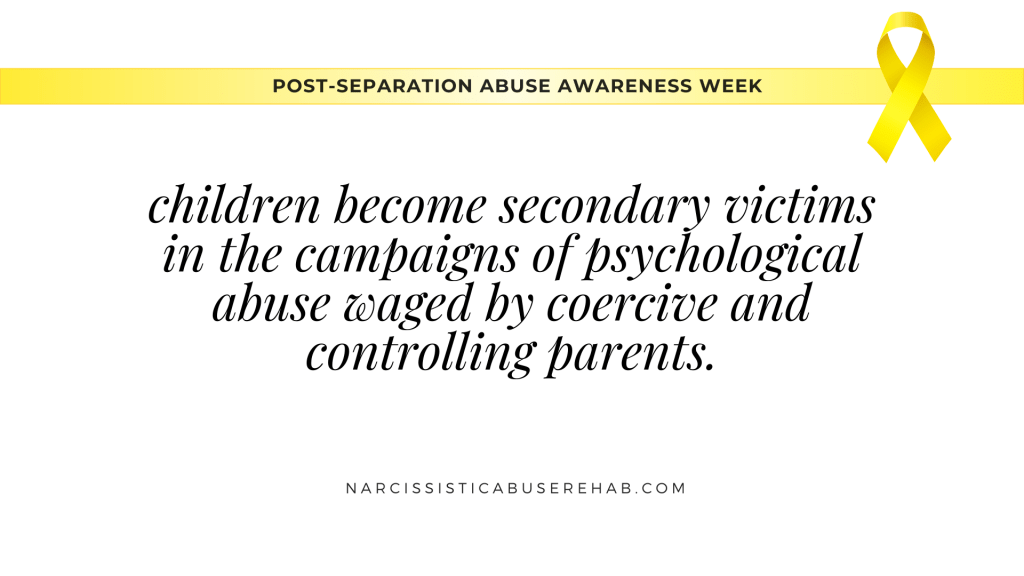From September 16 to September 23, 2024, Post-Separation Abuse Awareness Week will shine a light on an key aspect of coercive control that people don’t discuss nearly enough: the fact that the abuse often gets worse after the relationship ends. This initiative, launched by Kaleidoscopic UK in 2023, aims to raise awareness about what post-separation abuse looks like.
Post-separation abuse is an extension of coercive control, the context in which all domestic violence occurs. It includes physical, verbal, psycho-emotional, sexual, and financial abuse.
Kaleidoscopic UK’s initiative emphasizes the urgent need for professionals within the family court system—judges, attorneys, custody evaluators—to be trained to recognize post-separation abuse. Although resources exist for victims of coercive control during relationships, family courts remain the only place where victims can seek relief after separation. Unfortunately, many court professionals fail to identify or address post-separation abuse in custody disputes.
Leaving is the Most Dangerous Time for Victim-Survivors

It is a myth that the harms inflicted by antagonistic intimate partners cease with the end of an entrapment-based relationship. In fact, the abuser’s efforts to exert control over the victim-survivor usually intensifies.
Upon their exit from an abusive partners’ sphere of influence, the victim-survivor is subjected to tactics intended to negatively impact their mental health. The aggression is usually expressed as character assassination, various forms of humiliation, and hostile behaviors related to children and finances.
The ultimate expression of abusive power and control is the act of femicide. For this reason, leaving an entrapment-based relationship is the most dangerous time for victim-survivors of coercive control
In the words of Marie Skou, “In case you were wondering, we call ourselves survivors because not all of us make it out.”
Family Court As A Theatre of Post-Separation Abuse

In custody disputes with perpetrators of coercive control, three toxic dynamics emerge: the perpetrator’s need for control, their obsession with winning, and their desire to punish the victim-survivor for non-compliance. The family court serves as another weapon for the controlling person. In his groundbreaking research, Dr. Evan Stark found that children become secondary victims in the campaigns of psychological abuse waged by coercive and controlling parents.
These vindictive, self-serving behaviors are used by abusive partners to cope with the narcissistic injury of their victims leaving them. These tactics are designed to inflict further harm and prevent the victims-survivors from achieving independence. Furthermore, the trauma perpetrators of coercive control inflict leaves long-lasting scars on the children, causing high rates of Adverse Childhood Experiences (ACEs). Coercive and controlling behavior is a form of parental neglect and can devastate the emotional stability of children, leading to mental health conditions that remain into adulthood.
Key Aspects of Post-Separation Abuse
- Counter-Parenting – Abusers undermine the victim-survivors parental decisions regarding the child’s education, health, or well-being, often out of spite.
- Parental Alienation Allegations – This debunked legal strategy is often used by perpetrators of coercive control to dismiss legitimate claims of domestic violence.
- Neglectful Parenting – Abusers expose children to harm in a number of ways, including destabilizing the mental health of the other parent which can adversely affect the child, exposing the child to acts of physical and psycho-emotional abuse, manipulating the child, threatening to hurt the child to punish the other parent, etc.
- Isolation – The abuser assassinates the character of the victim-survivor by spreading false rumors about them. These smear campaigns erode the social support systems of the recipient of the abuse.
- Harassment and Stalking – Abusers continue to terrorize victims with threatening messages, social media monitoring, or physical stalking.
- Legal Abuse – Perpetrators of coercive control exploit the legal system, manipulating court orders to exhaust their victim’s financial and emotional resources.
- Financial Abuse – Perpetrators of coercive control delay support payments, block access to financial resources, and sabotage their victim’s career. The aim is to trap the victim in poverty so that they are financially dependent on the abuser.
The Rights of Victim-Survivors
Since post-separation abuse became a crime in England and Wales in April 2023, under the coercive and controlling behavior law, there are increasing efforts to challenge misconceptions about this form of abuse. During Post-Separation Abuse Awareness Week, Kaleidoscopic UK hosts events and shares resources to better equip the public and professionals. The initiative has received widespread support from charities, politicians, and international organizations. Kaleidoscopic UK’s hashtag, #PSAAW, and their infographic reached over 100,000 people globally.
Last year, Kaleidoscopic UK also released a Post-Separation Abuse Survey to gather critical data from victim-survivors, providing fresh insights into how widespread and devastating this issue remains.
The color yellow was chosen for the campaign’s ribbon, partly inspired by the song “Tie a Yellow Ribbon Round the Old Oak Tree,” symbolizing consensual reunions. However, the stark reality is that post-separation abuse is often a precursor to more extreme violence. In England and Wales, two women are killed each week by a current or former partner, a grim statistic that underscores the urgency of addressing this issue.
In the UK, Black women are disproportionately victims of femicides. Recent figures released by the Metropolitan Police have shown that Black women in London are significantly more likely to be victims of femicide compared to their representation in the population. In 2023, Black women made up 62% of femicide victims in London, despite representing only 14% of the female population.
Post-Separation Abuse Awareness Week is a pivotal step toward exposing and addressing a problem that remains largely misunderstood or dismissed. Advocates and survivors alike are calling for reforms to protect the most vulnerable from ongoing harm and to ensure justice for those impacted by this insidious form of coercive control.
Further Reading
- Spearman, Kathryn J., Jennifer L. Hardesty, and Jacquelyn Campbell. “Post-separation Abuse: A Concept Analysis.” Journal of Advanced Nursing 79, no. 4 (April 2023): 1225-1246. https://doi.org/10.1111/jan.15310.
- The Femicide Census.
- Southhall Black Sisters.
Photos by Deposit Photos.

